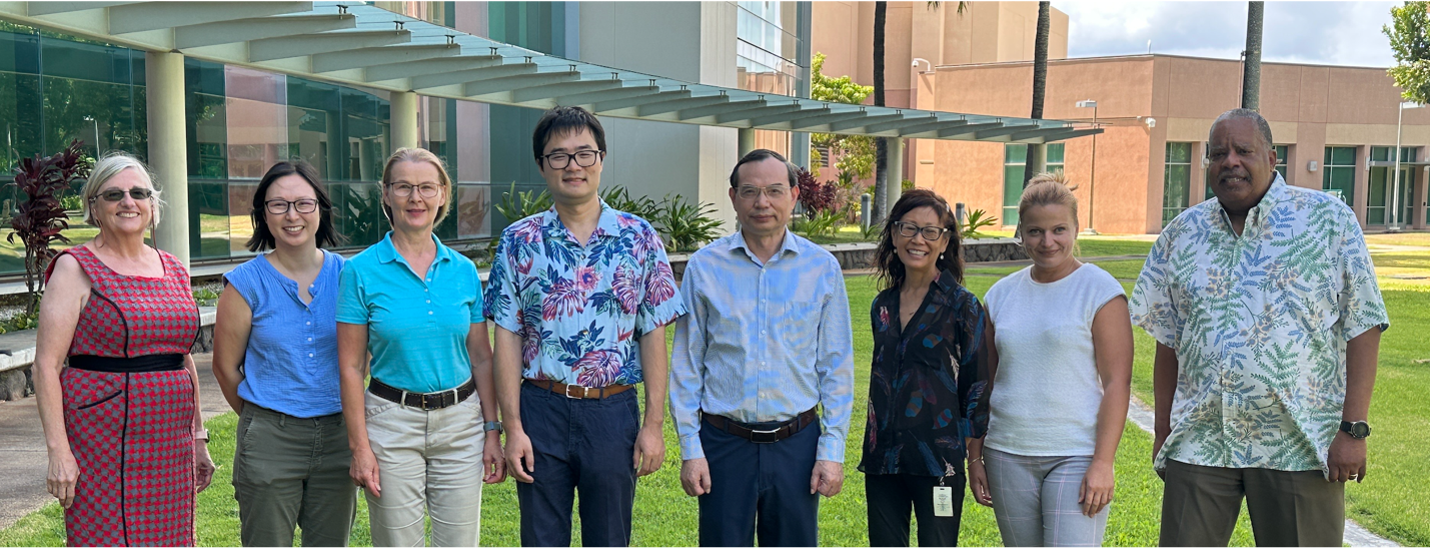The Pacific Center for Genome Research (PCGR) at the University of Hawaii at Manoa (UHM) aims to grow and support Genomic Research workforce at UHM, a Minority Serving Institution (MSI), which has a mission to serve historically underrepresented population in biomedical research, namely, Native Hawaiians and other Pacific Islanders.
Center Goals and Objectives
- Foster excellence in genomics research and grow and support the genomics workforce by providing practicum and research activities and experiences that are aligned with research projects and synergistic with existing University of Hawai‘i at Mānoa (UHM) programs.
- Cultivate community engagement with the diverse populations of Hawai‘i and integrate genomics research with culturally sensitive engagement of and partnering with stakeholders in our local Native Hawaiian (NH) communities.
- Build the foundation needed to amplify innovation and creativity in genomics research by bringing in new researchers and novel ideas and increasing participation of underrepresented populations and underserved communities that experience health disparities (including understudied NHs, other Pacific Islanders and Asian Americans).

Center Cores
- Administrative Core
Co-Leads: Lang Wu, Ph.D. and Youping Deng, Ph.D.
The Administrative Core (AC) will provide leadership and administrative management for the PCGR. The AC will build upon institutional resources, both administrative and scientific, to foster the implementation and coordination of the cooperative agreement (U54). The AC will also coordinate the U54 resource-building and career-development activities with those implemented by UHM, to achieve greater efficiency at the institutional level. Thus, this Core serves major administrative and integrative functions for the PCGR. This core will organize, integrate, and provide administrative management of all Projects and Cores; provide project management oversight to track milestones and timelines of the Projects and Cores; and facilitate collaborations.
- Workforce Development Core
Co-Leads: Jon-Paul Bingham, Ph.D., and Maarit Tiirikainen, Ph.D.
The Workforce Development Core (WDC) will establish a robust integrated training pipeline to develop foundational genomic and bioinformatic training and professional development experiences. Our training program involves soft skills, research and practical “on-the-degree” training and competencies in genomics and bioinformatics. The specific aims WDC include: 1) establishing a genomic education feeder pipeline to initiate, identify and support educational networks for advancing genomics skills; 2) on-the-degree genomics training to strengthen and support post-graduate pathways into genomics research; and 3) upskilling an advanced genomics workforce to develop and promote an advanced workforce training platform to meet the current and future research and industrial needs in genomics.
- Community Engagement Core
Co-Leads: Kevin Cassel Dr.PH and Alika Maunakea Ph.D.
The Community Engagement Core (CEC) will ensure the center’s consideration of equity and ethics in genomics research. The CEC will provide clinical and community stakeholder input and oversight for the two research projects. In addition to, supporting student, stakeholder and community education about genomics and the PCGR. This core will convene Community Advisory Boards among physicians, content experts and community stakeholders to support the promotion of and education about PCGR projects. Lastly, the CEC will also develop and implement a regular series of community seminars and workshops to disseminate findings from the PCGR and external genome research leaders and identify strategies for implementing these findings in clinical settings.
Research Projects
The Diversity Center for Genome Research at UHM supports research that focuses on health disparities affecting Native Hawaiian populations, with the potential to deliver genomics findings that aid Native Hawaiians and other underserved populations.
Integrating genome, other layers of omics, and non-genetic data to improve understanding of the etiology of human diseases in multi-ethnic populations
Lead: Lang Wu, Ph.D.
- There are urgent needs to identify causally related methylation, gene, protein, and metabolite biomarkers in blood for risk of multiple human diseases across racially and ethnically diverse populations.
- This study will identify causally related "-omic” biomarkers for multiple diseases of interest using an innovative design and evaluate interactions between newly identified and established markers and known non-genetic disease risk factors.
- Knowledge generated by this project will significantly contribute to the etiologic understanding of multiple diseases of interest across populations.
Characterizing genomic risk factors of lung cancers in Native Hawaiians
Lead: Youping Deng, Ph.D.
- Lung cancer is the second most common cancer in the United States and the leading cause of cancer-related deaths, and Native Hawaiians (NHs) not only have the greatest risk of lung cancer compared with other populations, but also the lowest survival outcomes.
- This project will carry out a genomic and epigenomic profiling study to help understand the health disparities of NH population in lung cancer risk.
- This project has the potential to be translated into improved lung cancer screening, precision prevention and therapeutic intervention in NH and other populations.
Last updated: December 8, 2023
